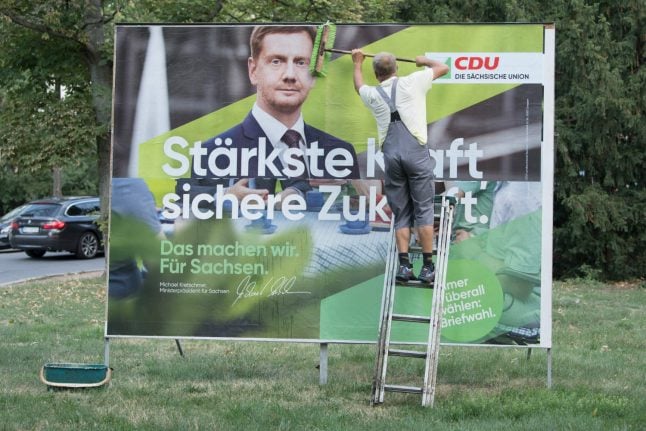As parties brought their big names out for the final rallies to end heated election campaigns, a survey shows support for Chancellor Angela Merkel’s centre-right Christian Democrats (CDU) in Saxony has increased slightly. Support for the centre-left Social Democrats (SPD) in Brandenburg has also gone up.
The CDU in Saxony, led by state premier Michael Kretschmer, reached 32 percent in the ZDF Politbarometer (plus 1 point compared to the previous week) – increasing its lead over the far-right Alternative for Germany (AfD). The anti-immigration party dropped by 0.5 to 24.5 percent in the latest poll.
Meanwhile, the Social Democrats in Brandenburg, led by state premier Dietmar Woidke, also gained one percentage point to reach 22 percent.
READ ALSO: Could the far-right AfD really win in upcoming German state elections?
But the SPD continues to compete closely with the AfD, which gained one point to reach 21 percent in the latest poll. As The Local has reported, if the AfD does win, it would be the first outright election victory for the party which rallies against Germany's recent mass migrant influx.
It does not mean that the AfD would come into power, however, as all parties have said they would not work with the party in government, and instead form their own coalitions.
 Dietmar Woidke, state premier of Brandenburg, campaigning in Panketal in July. Photo: DPA
Dietmar Woidke, state premier of Brandenburg, campaigning in Panketal in July. Photo: DPA
What about the other parties?
In Saxony, according to the poll, The Left (die Linke) gained 14 percent, the Greens scooped 11 percent (plus two points), and the SPD reached 8.5 percent. The pro-business Free Democrats (FDP) will be hoping they can reach the five percent needed to get into the state government.
In Brandenburg, according to the ZDF political barometer, the CDU ranked behind the SPD and AfD with 16.5 percent (minus 1.5), the Greens had 14.5 percent (plus 0.5), The Left had 14 percent, the FDP reached 5 percent and the Free Voters (Freie Wähler) managed 4 percent.
READ ALSO: Brandenburg elections – in east German rust belt, economic fears boost far right
At events on Friday, the parties are bringing out high-profile names to get residents on their side. In Brandenburg, the Greens will be enlisting the help of party co-leader Annalena Baerbock at a rally in Potsdam, while the SPD is pulling in Finance Minister Olaf Scholz in Oranienburg.
The AfD’s controversial Thuringia regional boss Björn Höcke will be on hand to help pull in voters in Königs Wusterhausen.
 The Greens co-leaders Robert Habeck and Annalena Baerbock campaigning in Dresden, Saxony, this week. Photo: DPA
The Greens co-leaders Robert Habeck and Annalena Baerbock campaigning in Dresden, Saxony, this week. Photo: DPA
In Saxony, CDU leader Annegret Kramp-Karrenbauer was due to campaign in Leipzig, while the Greens will draft in co-chairman Robert Habeck in a bid to convince voters.



 Please whitelist us to continue reading.
Please whitelist us to continue reading.
Member comments